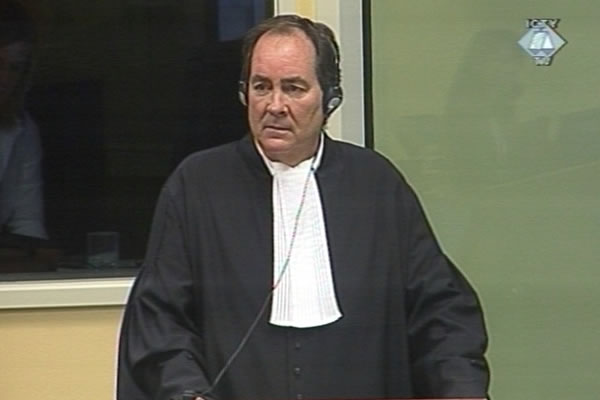Home
PROSECUTION CLOSES AT THE SREBRENICA SEVEN TRIAL
At the end of its closing argument, the prosecution refrained from calling for a specific sentence for the seven Bosnian Serb military and police officers charged with genocide and other crimes committed in Srebrenica and Zepa in July 1995. SENSE has learned that the prosecution has put that in its confidential final brief
 Peter McCloskey, vođa tima optužbe na suđenju sedmorici oficira vojske i policije bosanskih Srba, optuženih za zločine u Srebrenici
Peter McCloskey, vođa tima optužbe na suđenju sedmorici oficira vojske i policije bosanskih Srba, optuženih za zločine u Srebrenici The prosecution concluded its three-day closing argument at the trial of the Srebrenica Seven with an analysis of the evidence on the responsibility of Vinko Pandurevic and Ljubomir Borovcanin. Pandurevic is a former commander of the VRS Zvornik Brigade and Borovcanin commanded the police troops deployed in the Srebrenica operation in July 1995.
Both accused, prosecutor Peter McCloskey argued, had an opportunity to oppose the criminal orders and refuse to take part in the joint criminal enterprise resulting in the deaths of more than 7,000 men and the expulsion of tens of thousands of women and children from the Srebrenica and Zepa enclaves.
The police forces under Borovcanin’s command are blamed for the massacre of about 1,000 detained Muslims in a warehouse in Kravica. The prosecution reminded the court of a video recording made by Belgrade journalist Zoran Petrovic. At the time of the massacre, 13 July 1995, Petrovic drove by the Kravica warehouse together with Borovcanin. The video shows bodies piled up in front of the warehouse entrance and gunfire is heard. Having seen that, the prosecution contends, Borovcanin had to intervene and stop the executions that were ongoing, yet he didn’t do it. Borovcanin was bound by the Geneva conventions to do it; he is thus ‘guilty because he didn’t stop it’, the prosecution concluded.
For the prosecution, when Vinko Pandurevic returned to Zepa from Zvornik on 15 July 1995, he agreed to participate in the joint criminal enterprise. Pandurevic was told about the detainees in the Zvornik area and a column of Bosniaks pushing towards Tuzla after the fall of Srebrenica. The defense noted that Pandurevic ‘motivated by a desire to save lives’ let a part of that column pass through on 16 July 1995. The prosecution however interpreted Pandurevic’s motive as the need to save ‘the lives of Serbs’ because the Muslim column was a threat to the positions held by the Zvornik Brigade. At that moment Pandurevic hadn’t thought about Muslims at all, McCloskey argued.
Pandurevic’s defense tried to present a report he had sent to the Drina Corps on 18 July 1995 as his ‘protest’ against the fact that 3,000 ‘Turks of military age’ had been brought to the Zvornik area; the prosecution today interpreted it as a sign of his discontent at being tasked with killing those men. ‘There is no indication whatsoever that the killing of those men was the problem; the problem was only the fact that Pandurevic and his lads in Zvornik had to do it’, the prosecution said today.
The prosecution didn’t call for specific sentences for the seven accused officers in court, choosing to address the issue in the confidential final brief. However, judging by the seriousness of the crimes and the tone of the three-day closing argument it can be inferred that a life sentence was sought for most, if not all of the accused. The defense teams of the seven accused will deliver their arguments next week.
Linked Reports
- Case : Popovic et al. - "Srebrenica"
- 2009-09-03 PROSECUTION: RESPONSIBILITY FOR GENOCIDE IN SREBRENICA PROVEN
- 2009-09-02 TRIBUNAL’S THIRD TRIAL FOR SREBRENICA CRIMES NEARS ITS END
- 2009-05-01 LATEST FIGURES FOR SREBRENICA VICTIMS PRESENTED
- 2009-09-07 PROSECUTION: LIFE SENTENCE FOR THE SREBRENICA SEVEN
- 2009-09-09 DEFENSE POINTS OUT TO ‘PROSECUTION OMISSIONS’
- 2009-09-10 DEFENSE: ‘DEFORMED EVIDENCE’ OF THE PROSECUTION
